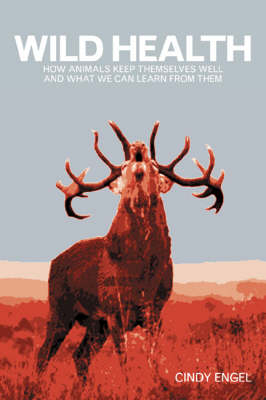
Wild Health
How Animals Keep Themselves Well and What We Can Learn from Them
Seiten
2002
Weidenfeld & Nicolson (Verlag)
978-0-297-64684-6 (ISBN)
Weidenfeld & Nicolson (Verlag)
978-0-297-64684-6 (ISBN)
- Titel ist leider vergriffen;
keine Neuauflage - Artikel merken
A guide to how animals avoid disease, injury and depression and the implications for human health.
How do animals keep themselves well in the wild? Folklore and traditional medicine have long laid claim to feats of self-medication by animals, but, until recently, scientists have dismissed such stories as romantic anthropomorphism. This is now changing as more and more scientists uncover examples of insects, birds and mammals self-medicating their ills. Chimpanzees carefully select bitter-tasting anti-parasitic plant 'medicines' that counter intestinal parasites, elephants roam miles to find the clay which counters dietary toxins, and many birds species line their nests with pungent medicinal leaves and so improve their chick's chances against the ravages of skin parasites. This book, the first general overview of the emerging science of 'zoopharmacognosy', explores the behavioural strategies animals use to maintain health by resorting to no more mystical an explanation than Darwinian selection. These strategies have successfully endured the ravages of natural selection and could provide a solid basis for improving the health of animals in our care.
By observing wild health and the many similarities with human self-medication, we may even discover (or rediscover) ways to further improve our own health.
How do animals keep themselves well in the wild? Folklore and traditional medicine have long laid claim to feats of self-medication by animals, but, until recently, scientists have dismissed such stories as romantic anthropomorphism. This is now changing as more and more scientists uncover examples of insects, birds and mammals self-medicating their ills. Chimpanzees carefully select bitter-tasting anti-parasitic plant 'medicines' that counter intestinal parasites, elephants roam miles to find the clay which counters dietary toxins, and many birds species line their nests with pungent medicinal leaves and so improve their chick's chances against the ravages of skin parasites. This book, the first general overview of the emerging science of 'zoopharmacognosy', explores the behavioural strategies animals use to maintain health by resorting to no more mystical an explanation than Darwinian selection. These strategies have successfully endured the ravages of natural selection and could provide a solid basis for improving the health of animals in our care.
By observing wild health and the many similarities with human self-medication, we may even discover (or rediscover) ways to further improve our own health.
Cindy Engel earned a PhD in animal behaviour from the University of East Anglia. Her fieldwork has followed the habits of rabbits in England and the movements of jaguars in the jungles of southern Mexico. She is an assistant lecturer in the Faculty of Environmental Science at the Open University, and is currently also a consultant in animal behaviour for various commercial organic farms. A freelance radio and television science advisor, she has recently worked on a wildlife series for the National Geographic Channel, and a BBC radio series on the natural history of medicine. Cindy is also a practitioner of holistic medicine, and lives on a smallholding in rural Suffolk with her two children.
| Erscheint lt. Verlag | 10.1.2002 |
|---|---|
| Zusatzinfo | 12 colour illustrations |
| Verlagsort | London |
| Sprache | englisch |
| Maße | 156 x 234 mm |
| Gewicht | 548 g |
| Themenwelt | Naturwissenschaften ► Biologie ► Zoologie |
| Veterinärmedizin ► Großtier ► Zoo- / Wildtier | |
| ISBN-10 | 0-297-64684-2 / 0297646842 |
| ISBN-13 | 978-0-297-64684-6 / 9780297646846 |
| Zustand | Neuware |
| Informationen gemäß Produktsicherheitsverordnung (GPSR) | |
| Haben Sie eine Frage zum Produkt? |
Mehr entdecken
aus dem Bereich
aus dem Bereich


